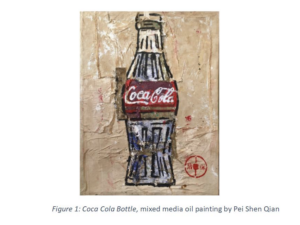What makes a work of art valuable? Many factors can contribute to the value of art, first and foremost being the popularity of the artist, their sales records, and their place in the cannon of art history. Other attributes such as condition, provenance, historical significance, medium, period, and subject matter can also affect the value of art.
But what initially ignites an artist into stardom? What makes a lesser-known artist suddenly achieve status in the art world, consequently causing the value of their work to rise?
 Most always in the art market, collectors are interested in what’s new and trending, artists who are up-and-coming, or who are established, sanctioned, recognized artists. Some styles of art and artists themselves go in and out of fashion, causing the value of their artwork to rise or fall according to trends.
Most always in the art market, collectors are interested in what’s new and trending, artists who are up-and-coming, or who are established, sanctioned, recognized artists. Some styles of art and artists themselves go in and out of fashion, causing the value of their artwork to rise or fall according to trends.
Art as an investment is a gamble in this way. The upwards trend in an artist’s popularity typically is the result of press coverage, major museum retrospectives, exhibitions at New York City and Los Angeles galleries, a celebrity collecting their work, a promising showing at Art Basel or other international art fairs and, in some instances… a scandal.
The Situation
Our fine art experts recently accepted a claim for a set of two mixed media collage works on paper by Pei Shen Qian (Chinese/American, b. 1940) which the insured purchased for $275 and $200 in 2018. In 2020, the artist was the subject of a popular Netflix documentary, Made You Look: A True Story About Fake Art. This is a documentary on the Knoedler art gallery scandal which amounted to $80 million of forged artworks sold over 14 years (1994–2008). The documentary traces the key figures in the scandal, one of which is Pei-Shen Qian, the artist of the forgeries.
Cracking the Case
Pei Shen Qian is now known internationally as an art forger whose imitations of paintings by Pollock, de Kooning and other abstract expressionists were sold as real for millions of dollars by the New York gallery Knoedler & Co., now defunct. In China, where he regularly returned for extended visits after moving to New York in 1981, Qian is known for his own paintings. He first emerged as an artist in the late 1970s, one of a group producing and exhibiting abstract work. In 2006, he had a 25-year retrospective at the BB Gallery in Shanghai. Yet he gained steady employment as a forger in the United States. Because there were limited original works by Pei Shen Qian in the market, since his notoriety from the documentary, the price of his works went up. Now, the same works on paper the insured purchased for $200-$275 were selling for $3,000.
The Result
The documentary aired in 2020 after the auction date/purchase date in 2018. The documentary caused a scandal in the market and created a notoriety for the artist, which did not exist before the documentary. This is likely the cause of the prices being driven up on the market plus the fact that there is currently a lack of supply for original works by Pei Shen Qian. The works on paper were each valued at $3,000, which is a 1,400% increase in value over a two-year period.
Qian has returned to China, escaping the prosecution after he was indicted for forgery charges. He maintains that he was unaware his works were being sold under the names of famous artists. Now in his early 80s, he continues to paint in a small studio outside Shanghai, but no longer sells his art, his wife told documentary filmmakers. While short-lived, the owner of the original Quian artworks in this claim benefited from the brief market high the artist experienced.
Was this article valuable?
Here are more articles you may enjoy.

 These Five Technologies Increase The Risk of Cyber Claims
These Five Technologies Increase The Risk of Cyber Claims  Uber Jury Awards $8.5 Million Damages in Sexual Assault Case
Uber Jury Awards $8.5 Million Damages in Sexual Assault Case  One out of 10 Cars Sold in Europe Is Now Made by a Chinese Brand
One out of 10 Cars Sold in Europe Is Now Made by a Chinese Brand  Elon Musk Alone Can’t Explain Tesla’s Owner Exodus
Elon Musk Alone Can’t Explain Tesla’s Owner Exodus 